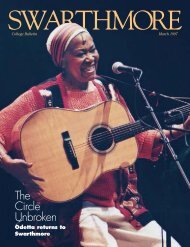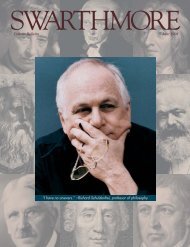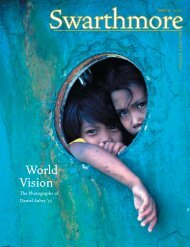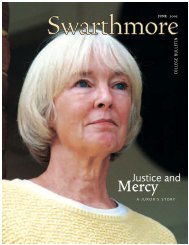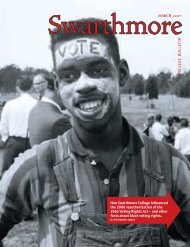Vietnam
Swarthmore College Bulletin (June 2006) - ITS
Swarthmore College Bulletin (June 2006) - ITS
- No tags were found...
Create successful ePaper yourself
Turn your PDF publications into a flip-book with our unique Google optimized e-Paper software.
The following is adapted from thebaccalaureate address delivered by Deanof the College Robert Gross on May 27.Gross retires this month after serving in theDean’s Office from 1991 to 2006 and as amember of the faculty in the Program inEducation from 1977 to 1983. From 1984to 1990, Gross served as head of the upperschool at Friends Select School in Philadelphia.The complete text of Dean Gross’ talk is atwww.swarthmore.edu/news/commencement2006/.what we are doing is intrinsically pleasurableor meaningful. What I wish for you is anopportunity to merge the two.Regarding interpersonal space, the questionis about what we owe to ourselves, whatwe owe to others, and how to bridge thegap. If we do not nurture ourselves—physically,emotionally, spiritually—we risk burningout and being of no use to others. Yet, ifall we are concerned with is ourselves, thenof what use are we to others? And if all wecare about are others, how do we maintainenough energy and commitment to actuallybe helpful to them?The third question is how to balancesecurity and risk. People are used to thinkingof these in terms of crafting an investmentpolicy, but sometimes it’s worth takingother sorts of risks in your career and relationships.The Quakers say that if you waiton the Light, the way will open. What thisELEFTHERIOS KOSTANSmeans to me is being open to opportunity,willing to give up the comfort of the familiar.It may be too late now, but it might havemeant sitting down in Sharples Dining Hallwith some people you didn’t know.Finally, there is the question of attitude:how to balance belief and doubt, or idealismand what one might call postmodern deconstructionism.To use a term more familiar atSwarthmore, how does ethical intelligencework? Beliefs and ideals are essential, andsocieties advance through the ethical commitmentsof their members. But ideals thatare not subject to reality testing can lead, atbest, to self-righteousness and, at worst, todisaster. Herman Kahn, who wrote On ThermonuclearWar in the 1960s, once said, “Inorder to make a revolution, you need a certainamount of ignorance, for knowledgedebilitates.” Perhaps so, but who wants arevolution based on ignorance?Intelligent analysis is essential, butmaybe Kahn was right: Knowledge candebilitate. You have been trained to findholes in the arguments of others, but if allarguments prove defective, what’s left? Weall celebrate healthy skepticism, but there’ssuch a thing as unhealthy skepticism. It’simportant that we respect the beliefs andideals of others and nourish our own—evenas we subject them to rigorous analysis. Thealternative is a corrosive cynicism that feedsoff the ideals of others.A half-century ago, the psychoanalystErik Erikson wrote that acquiring a sense ofidentity is the primary task of adolescence.And by a sense of identity, he meant not justthe objective description of one’s roles butrather the capacity to maintain a strongsense of self through the changes and challengesthat life presents. This, in turn,requires enduring confidence and selfesteem.I am mindful of what I told you4 years ago at orientation—that Swarthmore’senvironment and your own highstandards will place a lot of pressure onyour self-esteem. You have received a lot ofevaluation—from your professors, yourpeers, yourselves—and, sometimes, thesejudgments begin to define you.During the past week, a lot of judgmentshave been flying around: honors, Phi BetaKappa, and others. These distinctions feelslightly unsettling in this community andremind us that what makes the intensity ofSwarthmore tolerable is the College’s relativelack of competitiveness. But the judgmentsare there and, sadly, so is our tendencyto internalize the negative and reject thepositive.It is very distressing to me that someleave Swarthmore feeling less able thanwhen they entered—feeling “not goodenough.” One antidote to this is what I callGross’ Law of Personal Assessment: “Wheneverthere is a discrepancy between the wayyou value yourself and the way others valueyou, always go with the higher.”When I first spoke to you 4 years ago, Ifelt confident that Swarthmore would offeryou plenty of challenges, and I saw my jobthen as offering what support I could. Iremain confident today that the world outthere will continue to offer more thanenough challenges: careers, dissertations,relationships, children, public service. Soplease stand, and recite the mantra I taughtyou at orientation: “No matter what you sayor do to me, I am still a worthwhile person.”“No matter what you say or do to me, I amstill a worthwhile person.”Now, let me tell you some things you aregoing to hear during the next few years.Please respond with the mantra.“We were going to hire you, but then, welooked at your Facebook site.”“No matter what you say or do to me,I am still a worthwhile person.”“Do you really have to move all the wayto Seattle?”“No matter what you say or do to me,I am still a worthwhile person.”“I see your friends are getting married.And you?”“No matter what you say or do to me,I am still a worthwhile person.”“You have how many credit cards?”“No matter what you say or do to me,I am still a worthwhile person.”“Wow, a documentary film about transgenderedadolescents in Indonesia—howinteresting! Now, could I have two doublelattes to go?”“No matter what you say or do to me,I am still a worthwhile person.”“Swarthmore—isn’t that a girl’s schoolin upstate New York?”Applause. Tjune 2006 : 13








